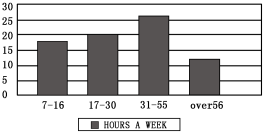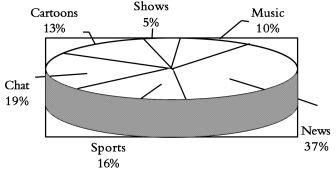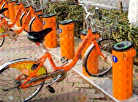-
阅读理解
Who “entertained us, challenged us and changed our world”? Absolutely, Jeremy Lin, an Asian-American NBA rising star, is one of those people. TIME Magazine named him one of 2012’s Most Influential People in the World.
Lin, 23, is not just a good basketball player, but also a graduate of Harvard University, one of the best universities in the world.
“Lin has broken the idea that one can’t be a world-class player on the court and an excellent student off the court at the same time.” US Education Secretary Arne Duncan wrote in the TIME article about Lin.
At 191cm, Lin isn’t especially strong, compared with other point guards (组织后卫) in the league. What makes Lin special from other players is his hard work and never-give-up spirit.
“I know how the league works. I may not get an opportunity(机会), but I’m just going to put it all into this and see what happens.” Lin once said. He kept arriving early, leaving late, practicing hard and learning from other experienced players. Finally, when his opportunity came, he started to shine.
“He earned it.” Duncan said. “He lives the right way, and he plays the right way. He works hard and stays modest. He sets a good example for young people today. ”
1.What did TIME Magazine name Jeremy Lin?
A. He is an Asian-American NBA basketball player.
B. He is one of the most influential people in the USA.
C. He entertains us, challenges us and changes our world.
D. He is one of the most influential people in 2012 in the world.
2.What makes Lin special from other players?
A. His university.
B. Never-give-up spirit.
C. His opportunity.
D. Never practicing hard.
3.Why did Lin start to shine when his opportunity came?
A. Because he knew how the league worked.
B. Because he graduated from Harvard University.
C. Because he is an Asian-American NBA rising star.
D. Because he practiced hard and learned from other experienced players.
4.Which is the best title of the passage?
A. Hard Work Paid Off
B. Harvard Owns the Best
C. Jeremy Lin’s School Life
D. Teamwork Comes First
难度: 中等查看答案及解析
-
Every day since March 8, people all over the world keep asking the same question: Where did Malaysia Airlines Flight MH370 go? It turns out to be the biggest mystery in modern aviation (航空) history.
In the early hours of March 8, a Boeing 777 took off from Malaysia’s capital Kuala Lumpur (吉隆坡). It was heading to Beijing.
But about two hours into the flight, the plane lost contact. There were 239 people on board the Malaysia Airlines flight, including 154 Chinese.
About 12 countries, including China, the US and Australia, have joined the search for the missing plane and passengers. The plane’s disappearance was a “mystery”, said officials. The plane was flying at a height of more than 10,000 meters when it suddenly lost contact. The weather was clear. The pilots didn’t make any distress calls (求救信号). When a plane crashes, broken parts are usually recovered. But up to April 2, officials have not found anything. People are also talking about a possible hijacking. Interpol (国际刑警组织) said that two people on the flight used stolen passports. But that information alone isn’t evidence(证据) of a hijack.
The investigation (调查) is still going on. It could take months or even years to find out what happened to the flight.
“We are looking at all possibilities,” said Malaysian Transport Minister Hishamuddin Hussein. “The most important thing now is to find the plane.”
On March 24 came a piece of sad news. Malaysian Prime Minister Najib Razak said that the plane “ended in the southern Indian Ocean”. Everyone on the plane died. But the mystery is still not solved. Nobody is giving up. China has said it will work hard to find out the truth at all costs.
1.Which country was the Flight MH370 flying to ?
A.Malaysia. B.China.
C.Australia. D.the US.
2.From the article above, it is clearly that __________.
A.two passengers (乘客) didn’t use the passports of their own.
B.the plane was hijacked by two people.
C.Interpol has known what happened to the flight.
D.broken parts has been found by April 2.
3.Where can you probably read the article?
A.In a travel guide.
B.In a history book.
C.In a novel book.
D.In a newspaper
难度: 中等查看答案及解析
-
Last year, some groups of students in their community made a survey about “How do people spend their free time? ” The following diagrams show some results of it:
Diagram (1): Hours for people of different ages who surf the Internet in a week.

Diagram (2): Different days people go to the library. (library attendance)

Diagram (3): Different programs people like.

1.People aged spend the most time surfing the Internet every week.
A. 7—16 B. 17—30 C. 31—55 D. over 56
2. How many people go to the library on Saturdays?
A. About 20%. B. About 40%.
C. Over 60%. D. More than 80%.
3.Which of the following is TRUE according to the diagrams?
A. The fewest people like watching music programs.
B. Sports are the most people’s favorite programs.
C. People seldom go to the library on weekdays.
D. Half of the people like watching news and cartoons.
4. The three diagrams show us the results of a survey about
A. what people do every day
B. people’s different habits.
C. people’s different lifestyles
D. how people spend their free time
难度: 中等查看答案及解析
-
A new study finds that plants communicate with one another to warn of danger.
We often consider plants as the furniture of the natural world. They don’t move; they don’t make sounds, they don’t seem to act on anything. But as is often the case, plants talk to each other all the time. And the language is chemical.

Over the years, scientists have reported that different types of plants, from trees to tomatoes, give out chemicals into the air to help neighboring plants. These chemical warnings can spread information about one plant’s disease or infestation(虫害), so other plants can protect themselves. But how plants receive and act on many of the information exactly is still mysterious.
In this week’s Science Magazine, researchers in Japan offered some explanations. They have found out one chemical message and traced it all the way from beginning to end.
The scientists looked at tomato plants infested by a common pest(害虫). To start out, they grew plants in two separate plastic spaces connected by a tube(管子). One plant was infested and placed upwind and the other was uninfested and placed downwind. The downwind plants were later exposed(暴露) to the pest. The results showed that plants near sick neighbors before were able to protect themselves better against the pest.
They found one chemical appeared more often in the exposed plants. The chemical is called HexVic. The scientists discovered where HexVic come from, and put it over healthy plants. Those plants were then able to produce HexVic. Researchers made sure that uninfested plants could fight off bugs and diseases. How do they know when to protect themselves? They are warned first by their friendly plant neighbors.
It is not a simple story, and it may be happening in more plant species than tomatoes. It may also be happening with more chemical signals that are still unknown to us. In a word, we know that plants not only communicate, but also look out for one another.
1.The underlined “traced” in the fourth paragraph probably means _________ here.
A. reported B. followed C. doubted D. developed
2.For scientists, which are the right steps to watch tomato plants infested by a pest?
①Place the infested plant upwind.
②Place the uninfested plant downwind.
③Expose the downwind plants to the pest.
④Grow plants in two separate plastic spaces connected by a tube.
A. ③①②④ B. ③④①② C. ④①②③ D. ④③①②
3. You can put the sentence “The researches also studied leaves from exposed plants and unexposed plants.” At the beginning of ____________.
A. Paragraph 3 B. Paragraph 4 C. Paragraph 5 D. Paragraph 6
4.Which of the following can be the best title of this passage?
A. Communicating Plants and Terrible Diseases
B. Talking Plants and Friendly Warnings
C. Protecting Plants and Clear Information
D. Growing Plants and Mysterious Chemicals
难度: 中等查看答案及解析

